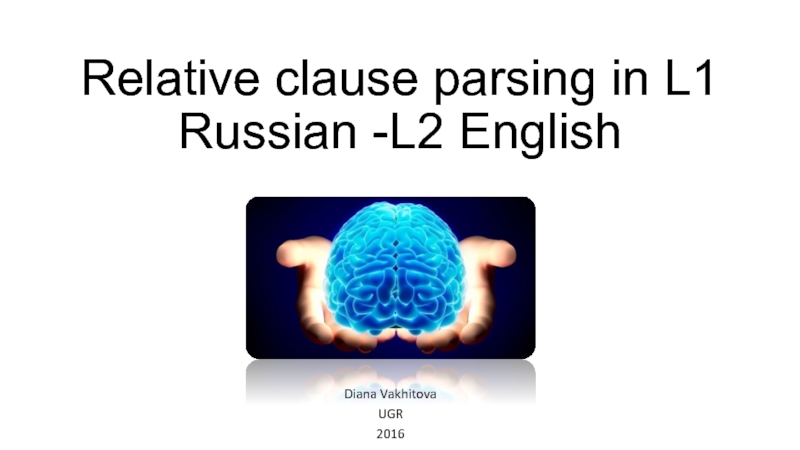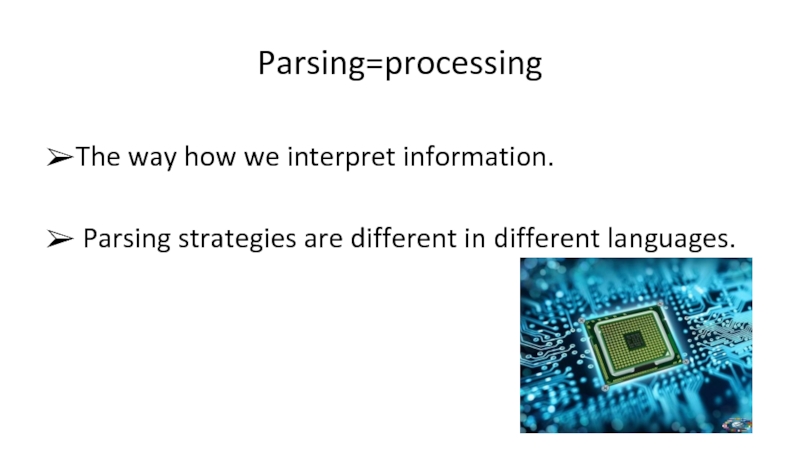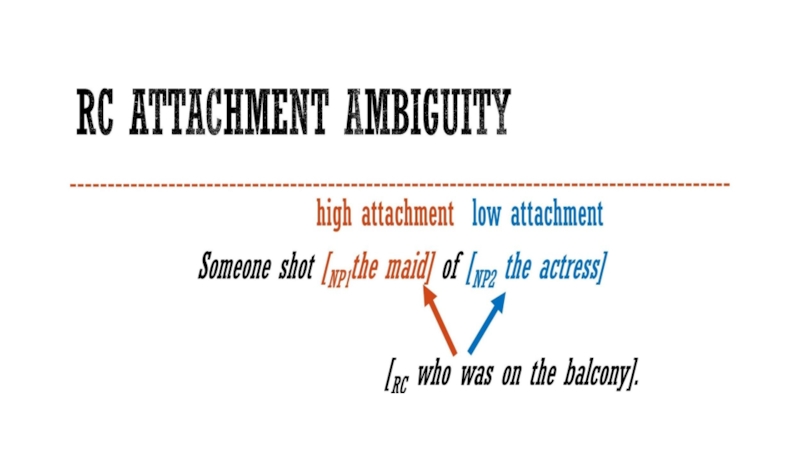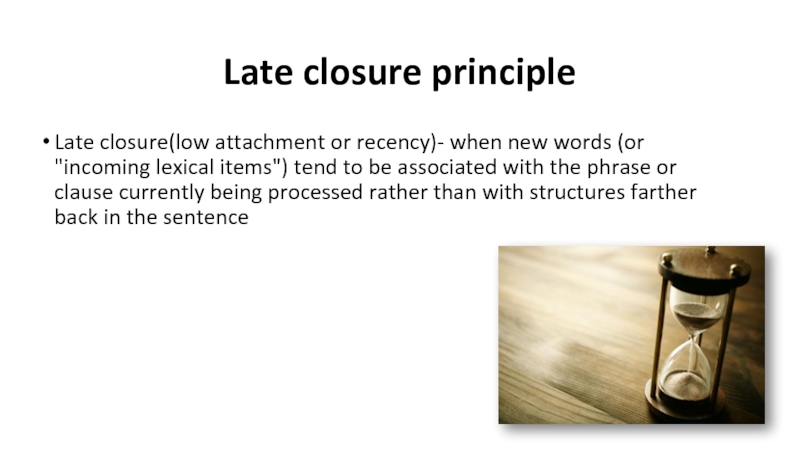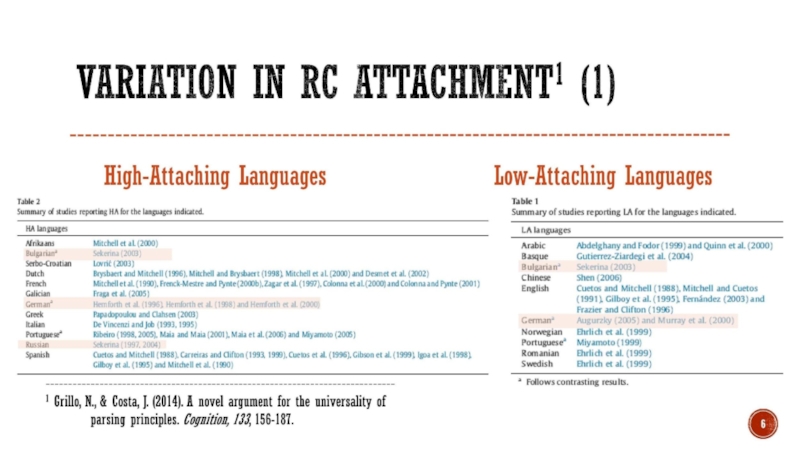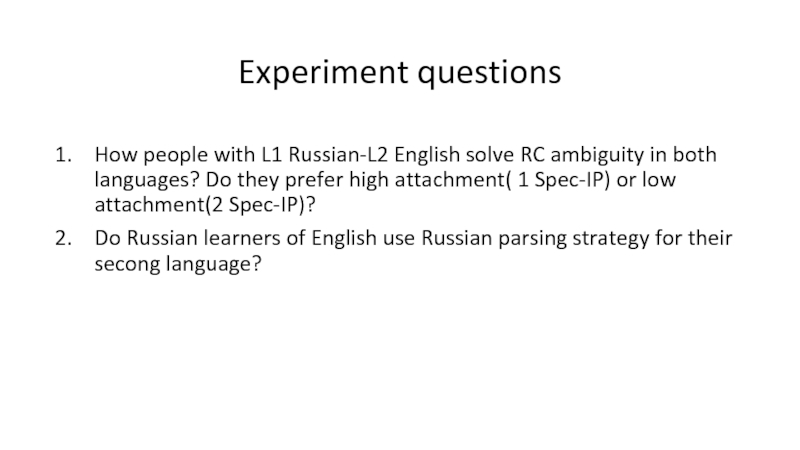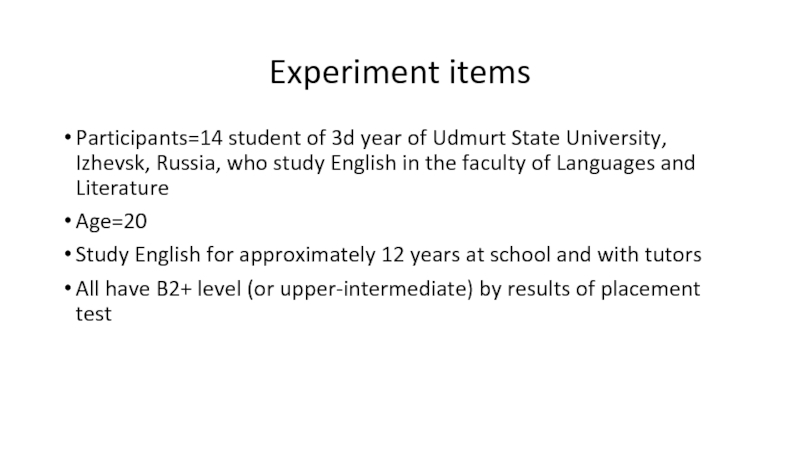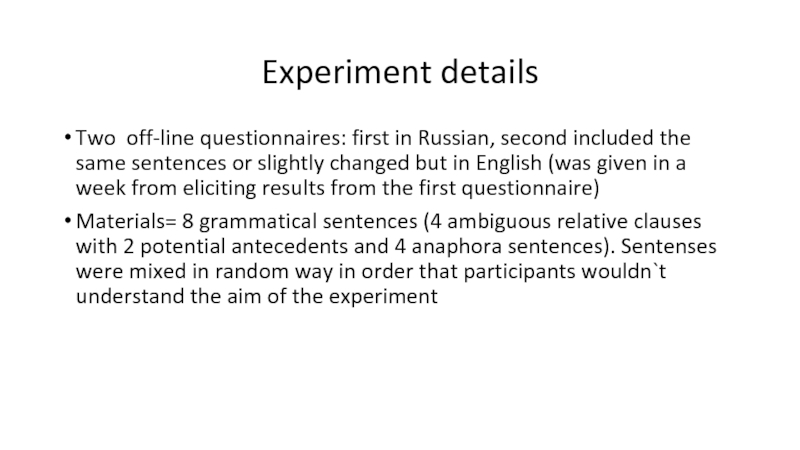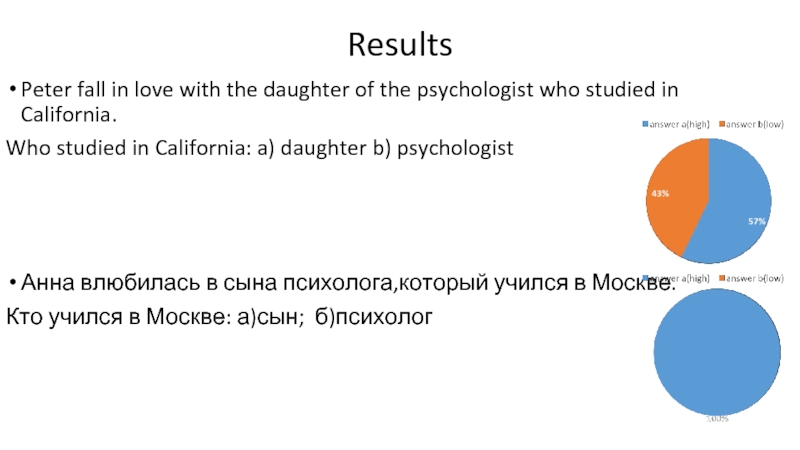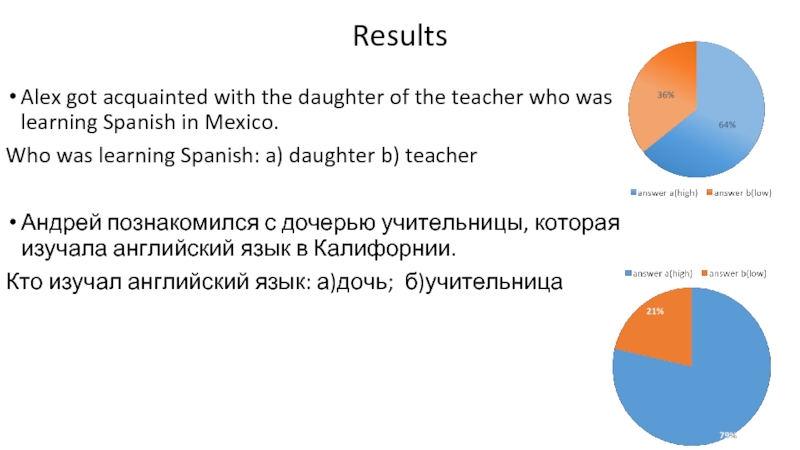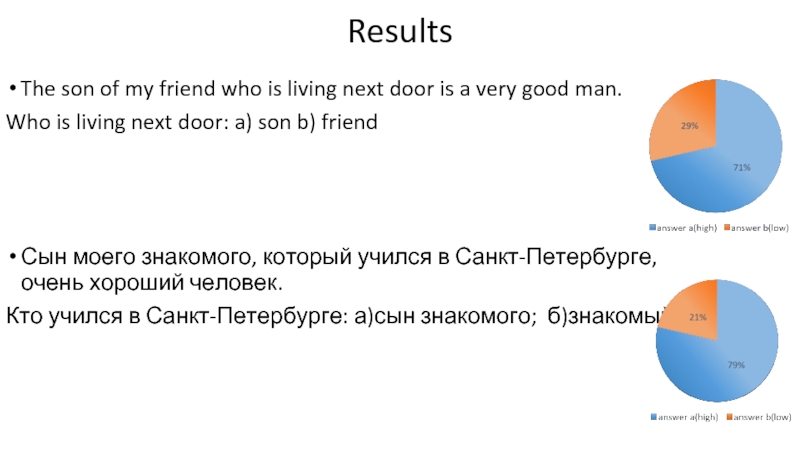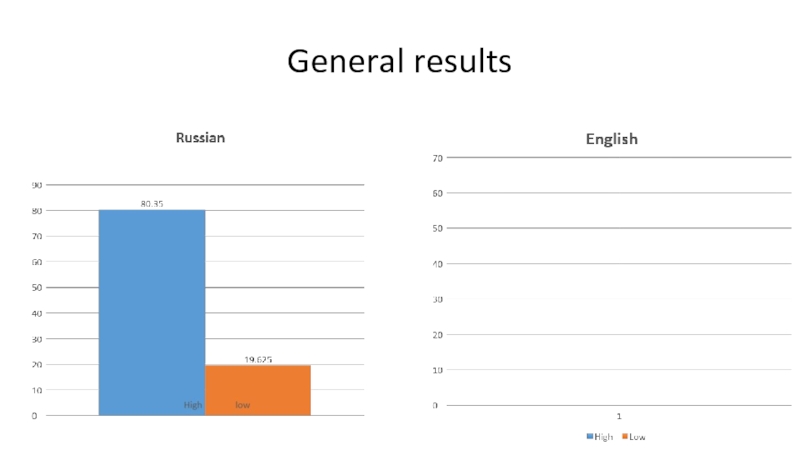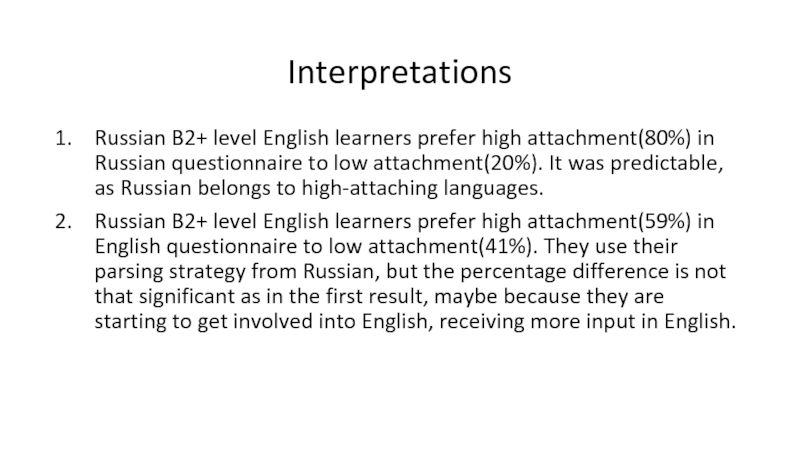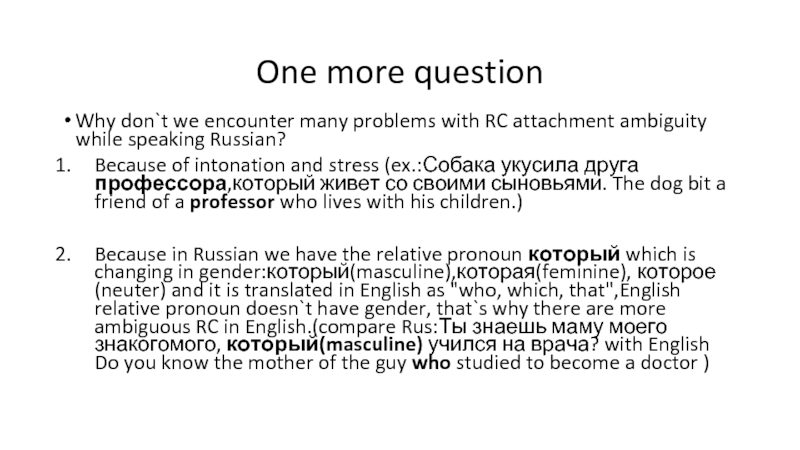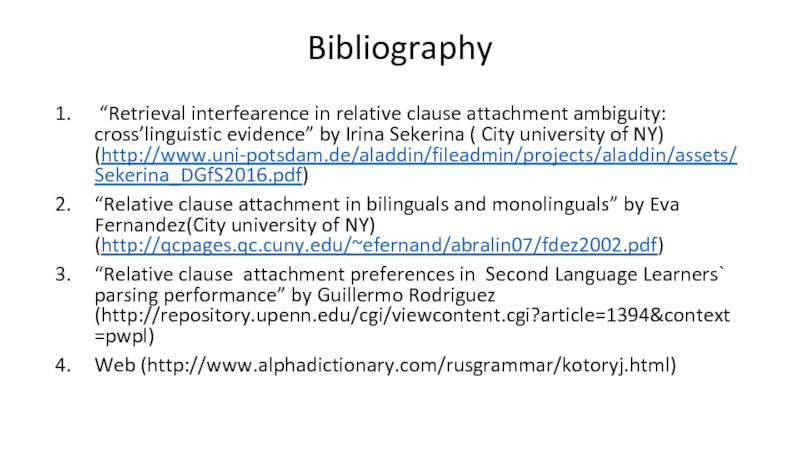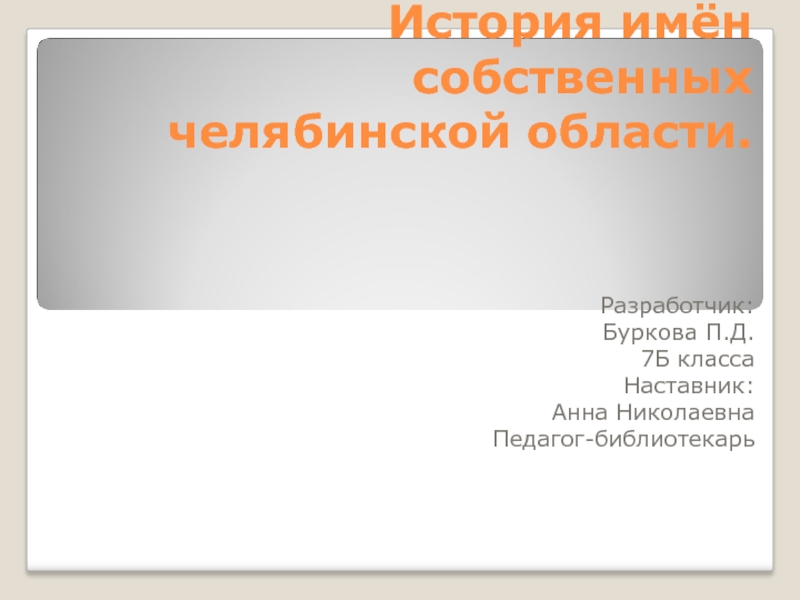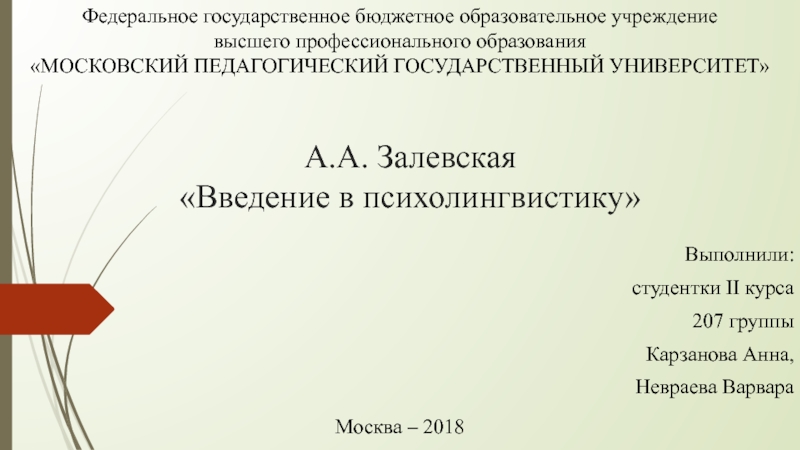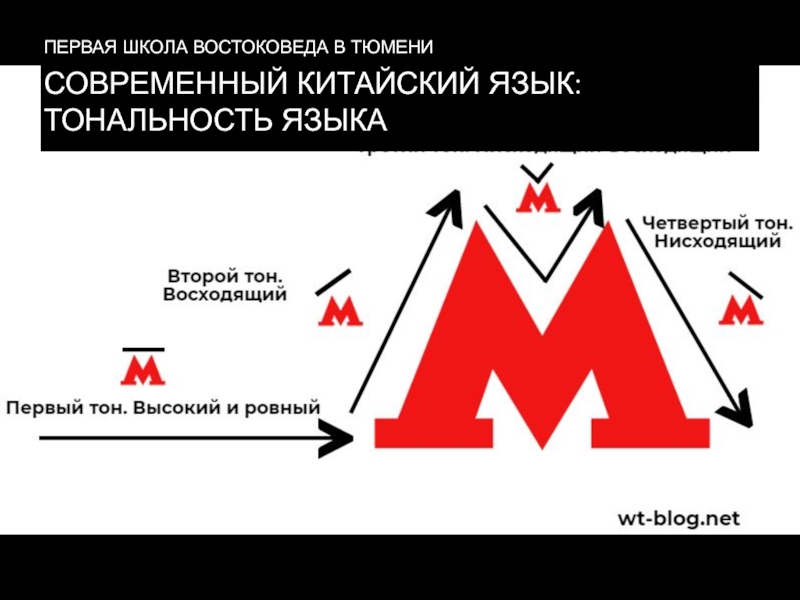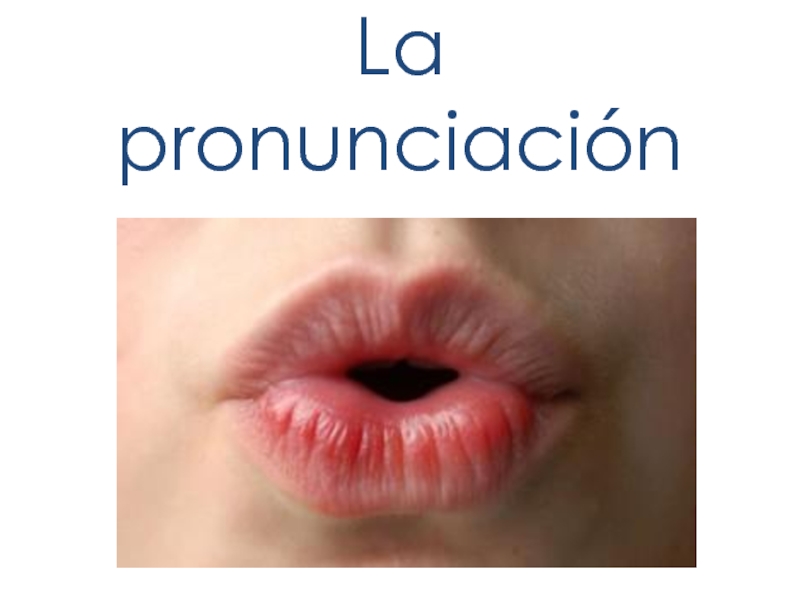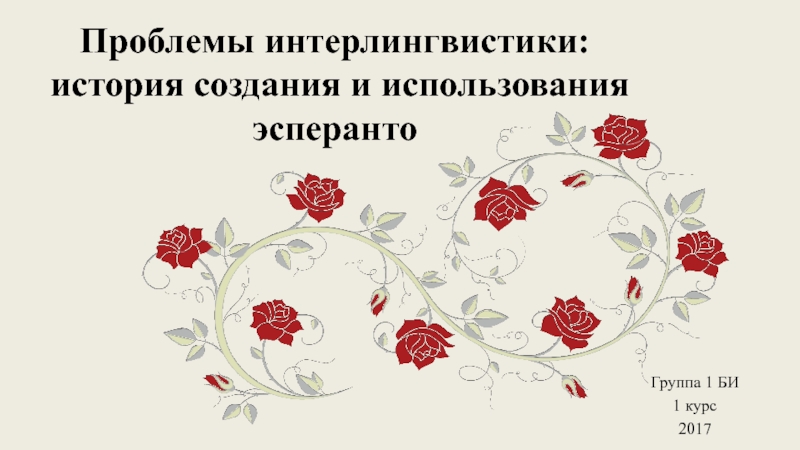- Главная
- Разное
- Дизайн
- Бизнес и предпринимательство
- Аналитика
- Образование
- Развлечения
- Красота и здоровье
- Финансы
- Государство
- Путешествия
- Спорт
- Недвижимость
- Армия
- Графика
- Культурология
- Еда и кулинария
- Лингвистика
- Английский язык
- Астрономия
- Алгебра
- Биология
- География
- Детские презентации
- Информатика
- История
- Литература
- Маркетинг
- Математика
- Медицина
- Менеджмент
- Музыка
- МХК
- Немецкий язык
- ОБЖ
- Обществознание
- Окружающий мир
- Педагогика
- Русский язык
- Технология
- Физика
- Философия
- Химия
- Шаблоны, картинки для презентаций
- Экология
- Экономика
- Юриспруденция
Relative clause parsing in L1 Russian -L2 English презентация
Содержание
- 1. Relative clause parsing in L1 Russian -L2 English
- 2. Parsing=processing The way how we interpret
- 4. Late closure principle Late closure(low attachment or
- 6. Experiment questions How people with L1 Russian-L2
- 7. Experiment items Participants=14 student of 3d year
- 8. Experiment details Two off-line questionnaires: first in
- 9. Results The dog bit a friend of
- 10. Results Peter fall in love with the
- 11. Results Alex got acquainted with the daughter
- 12. Results The son of my friend who
- 13. General results
- 14. Interpretations Russian B2+ level English learners prefer
- 15. One more question Why don`t we encounter
- 16. Bibliography “Retrieval interfearence in relative clause
Слайд 2Parsing=processing
The way how we interpret information.
Parsing strategies are different in
different languages.
Слайд 4Late closure principle
Late closure(low attachment or recency)- when new words (or
"incoming lexical items") tend to be associated with the phrase or clause currently being processed rather than with structures farther back in the sentence
Слайд 6Experiment questions
How people with L1 Russian-L2 English solve RC ambiguity in
both languages? Do they prefer high attachment( 1 Spec-IP) or low attachment(2 Spec-IP)?
Do Russian learners of English use Russian parsing strategy for their secong language?
Do Russian learners of English use Russian parsing strategy for their secong language?
Слайд 7Experiment items
Participants=14 student of 3d year of Udmurt State University, Izhevsk,
Russia, who study English in the faculty of Languages and Literature
Age=20
Study English for approximately 12 years at school and with tutors
All have B2+ level (or upper-intermediate) by results of placement test
Age=20
Study English for approximately 12 years at school and with tutors
All have B2+ level (or upper-intermediate) by results of placement test
Слайд 8Experiment details
Two off-line questionnaires: first in Russian, second included the same
sentences or slightly changed but in English (was given in a week from eliciting results from the first questionnaire)
Materials= 8 grammatical sentences (4 ambiguous relative clauses with 2 potential antecedents and 4 anaphora sentences). Sentenses were mixed in random way in order that participants wouldn`t understand the aim of the experiment
Materials= 8 grammatical sentences (4 ambiguous relative clauses with 2 potential antecedents and 4 anaphora sentences). Sentenses were mixed in random way in order that participants wouldn`t understand the aim of the experiment
Слайд 9Results
The dog bit a friend of a professor who lives with
his children.
Who lives with children a) friend b) professor
Собака укусила друга профессора,который живет со своими сыновьями.
Кто живет с сыновьями: а)друг; б)профессор
Who lives with children a) friend b) professor
Собака укусила друга профессора,который живет со своими сыновьями.
Кто живет с сыновьями: а)друг; б)профессор
Слайд 10Results
Peter fall in love with the daughter of the psychologist who
studied in California.
Who studied in California: a) daughter b) psychologist
Анна влюбилась в сына психолога,который учился в Москве.
Кто учился в Москве: а)сын; б)психолог
Who studied in California: a) daughter b) psychologist
Анна влюбилась в сына психолога,который учился в Москве.
Кто учился в Москве: а)сын; б)психолог
Слайд 11Results
Alex got acquainted with the daughter of the teacher who was
learning Spanish in Mexico.
Who was learning Spanish: a) daughter b) teacher
Андрей познакомился с дочерью учительницы, которая изучала английский язык в Калифорнии.
Кто изучал английский язык: а)дочь; б)учительница
Who was learning Spanish: a) daughter b) teacher
Андрей познакомился с дочерью учительницы, которая изучала английский язык в Калифорнии.
Кто изучал английский язык: а)дочь; б)учительница
Слайд 12Results
The son of my friend who is living next door is
a very good man.
Who is living next door: a) son b) friend
Сын моего знакомого, который учился в Санкт-Петербурге, очень хороший человек.
Кто учился в Санкт-Петербурге: а)сын знакомого; б)знакомый
Who is living next door: a) son b) friend
Сын моего знакомого, который учился в Санкт-Петербурге, очень хороший человек.
Кто учился в Санкт-Петербурге: а)сын знакомого; б)знакомый
Слайд 14Interpretations
Russian B2+ level English learners prefer high attachment(80%) in Russian questionnaire
to low attachment(20%). It was predictable, as Russian belongs to high-attaching languages.
Russian B2+ level English learners prefer high attachment(59%) in English questionnaire to low attachment(41%). They use their parsing strategy from Russian, but the percentage difference is not that significant as in the first result, maybe because they are starting to get involved into English, receiving more input in English.
Russian B2+ level English learners prefer high attachment(59%) in English questionnaire to low attachment(41%). They use their parsing strategy from Russian, but the percentage difference is not that significant as in the first result, maybe because they are starting to get involved into English, receiving more input in English.
Слайд 15One more question
Why don`t we encounter many problems with RC attachment
ambiguity while speaking Russian?
Because of intonation and stress (ex.:Собака укусила друга профессора,который живет со своими сыновьями. The dog bit a friend of a professor who lives with his children.)
Because in Russian we have the relative pronoun который which is changing in gender:который(masculine),которая(feminine), которое(neuter) and it is translated in English as "who, which, that",English relative pronoun doesn`t have gender, that`s why there are more ambiguous RC in English.(compare Rus:Ты знаешь маму моего знакогомого, который(masculine) учился на врача? with English Do you know the mother of the guy who studied to become a doctor )
Because of intonation and stress (ex.:Собака укусила друга профессора,который живет со своими сыновьями. The dog bit a friend of a professor who lives with his children.)
Because in Russian we have the relative pronoun который which is changing in gender:который(masculine),которая(feminine), которое(neuter) and it is translated in English as "who, which, that",English relative pronoun doesn`t have gender, that`s why there are more ambiguous RC in English.(compare Rus:Ты знаешь маму моего знакогомого, который(masculine) учился на врача? with English Do you know the mother of the guy who studied to become a doctor )
Слайд 16Bibliography
“Retrieval interfearence in relative clause attachment ambiguity: cross’linguistic evidence” by
Irina Sekerina ( City university of NY) (http://www.uni-potsdam.de/aladdin/fileadmin/projects/aladdin/assets/Sekerina_DGfS2016.pdf)
“Relative clause attachment in bilinguals and monolinguals” by Eva Fernandez(City university of NY) (http://qcpages.qc.cuny.edu/~efernand/abralin07/fdez2002.pdf)
“Relative clause attachment preferences in Second Language Learners` parsing performance” by Guillermo Rodriguez (http://repository.upenn.edu/cgi/viewcontent.cgi?article=1394&context=pwpl)
Web (http://www.alphadictionary.com/rusgrammar/kotoryj.html)
“Relative clause attachment in bilinguals and monolinguals” by Eva Fernandez(City university of NY) (http://qcpages.qc.cuny.edu/~efernand/abralin07/fdez2002.pdf)
“Relative clause attachment preferences in Second Language Learners` parsing performance” by Guillermo Rodriguez (http://repository.upenn.edu/cgi/viewcontent.cgi?article=1394&context=pwpl)
Web (http://www.alphadictionary.com/rusgrammar/kotoryj.html)
